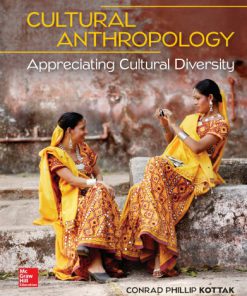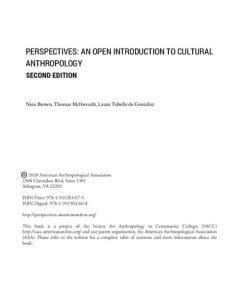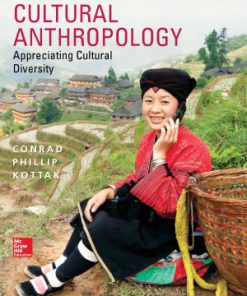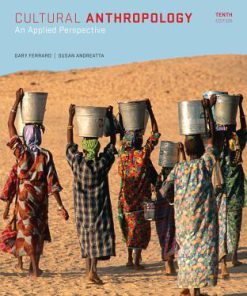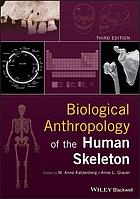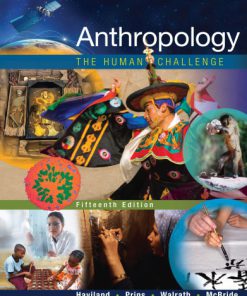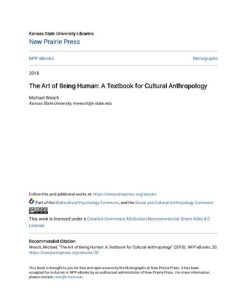Cultural anthropology : the human challenge 15th Edition by Dana 1305633792 9781305633797
$50.00 Original price was: $50.00.$25.00Current price is: $25.00.
Cultural anthropology the human challenge 15th Edition by Dana Walrath – Ebook Instant Download/Delivery ISBN(s): 1305633792, 9781305633797
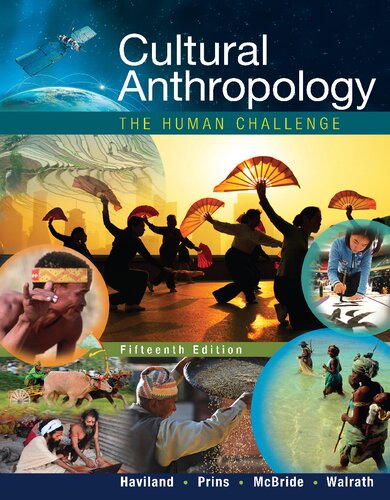
Product details:
- ISBN 10: 1305633792
- ISBN 13: 9781305633797
- Author: Dana Walrath
Offering compelling photos, engaging examples, and select studies by anthropologists in a variety of locations around the globe, this market-leading text presents cultural anthropology in vivid, accessible terms showing students how this discipline is relevant to understanding the complex world around them. Honed, streamlined, and extensively updated throughout, the 15th edition presents the fundamental concepts from a holistic perspective using three unifying themes: 1) the varied ways humans face the challenges of existence, 2) the connections between culture and biology in shaping human beliefs and behavior, and 3) the impact of globalization on peoples and cultures around the world. This edition also retains its integrated coverage of race, class, gender, and ethnicity, as well as its popular Globalscape feature, which gets students thinking about the consequences of globalization and (sometimes) their own behavior. A strong supplements program provides instructors and students with a wealth of resources designed to enhance the teaching and learning experience.
Table of contents:
Chapter 1. The Essence of Anthropology
The Anthropological Perspective
Anthropology and Its Fields
Cultural Anthropology
Linguistic Anthropology
Archaeology
Biological Anthropology
Anthropology, Science, and the Humanities
Doing Anthropology in the Field
Questions of Ethics
Anthropology and Globalization
Chapter Checklist
Questions for Reflection
Digging into Anthropology
Chapter 2. Characteristics of Culture
Culture and Adaptation
The Concept and Characteristics of Culture
Culture Is Learned
Culture Is Shared
Culture Is Based on Symbols
Culture Is Integrated
Culture Is Dynamic
Functions of Culture
Culture, Society, and the Individual
Culture and Change
Ethnocentrism, Cultural Relativism, and Evaluation of Cultures
Chapter Checklist
Questions for Reflection
Digging into Anthropology
Chapter 3. Ethnographic Research—Its History, Methods, and Theories
History of Ethnographic Research and Its Uses
Salvage Ethnography or Urgent Anthropology
Acculturation Studies
Applied Anthropology
Studying Cultures at a Distance
Studying Contemporary State Societies
Studying Peasant Communities
Advocacy Anthropology
Studying Up
Globalization and Multi-Sited Ethnography
Doing Ethnography
Site Selection and Research Question
Preparatory Research
Participant Observation: Ethnographic Tools and Aids
Data Gathering: The Ethnographer’s Approach
Challenges of Ethnographic Fieldwork
Social Acceptance
Physical Danger
Subjectivity, Reflexivity, and Validation
Completing an Ethnography
Building Ethnological Theories
Ethnology and the Comparative Method
A Brief Overview of Anthropology’s Theoretical Perspectives
Mentalist Perspective
Materialist Perspective
Other Theoretical Perspectives
Ethical Responsibilities in Anthropological Research
Chapter Checklist
Questions for Reflection
Digging into Anthropology
Chapter 4. Becoming Human—The Origin and Diversity of Our Species
Humans and Other Primates
An African Perspective on Great Apes
Europeans Classify Apes as Humanlike Animals
Linnaeus Orders the Natural System
A Short History of Research on Evolution and Genetics
Darwin as Father of Evolutionary Theory
Mendel as Father of Genetics
A Microscopic Perspective on Biological Evolution
Molecular Clock
Genetic Mapping
Evolution through Adaptation
Primate Anatomical Adaptation
Primate Behavioral Adaptation
Human Ancestors
The First Bipeds
Early Homo
Archaic Humans
Neandertals
Denisovans as Long-Lost Archaic Cousins
Global Expansion of Homo Sapiens
Anatomically Modern Peoples in the Upper Paleolithic
Human Migrations from Siberia to America
New Human Era with the Domestication of Animals and Plants
Human Biological Variation and the Problem of Race
Skin Color
Race as a Social Construct
Chapter Checklist
Questions for Reflection
Digging into Anthropology
Chapter 5. Language and Communication
Linguistic Research and the Nature of Language
Descriptive Linguistics
Phonology
Morphology, Syntax, and Grammar
Historical Linguistics
Processes of Linguistic Divergence
Language Loss and Revival
Language in Its Social and Cultural Settings
Sociolinguistics
Ethnolinguistics
Language Versatility
Beyond Words: The Gesture–Call System
Nonverbal Communication
Paralanguage
Tonal Languages
Talking Drums and Whistled Speech
The Origins of Language
From Speech to Writing
Literacy and Modern Telecommunication
Chapter Checklist
Questions for Reflection
Digging into Anthropology
Chapter 6. Social Identity, Personality, and Gender
Enculturation: The Self and Social Identity
Self-Awareness
Social Identity through Personal Naming
Self and the Behavioral Environment
Culture and Personality
A Cross-Cultural Perspective on Gender and Personality
Case Study: Childrearing and Gender among the Ju/’Hoansi
Three Childrearing Patterns
Group Personality
Alternative Gender Models
Intersexuality
Transgender
Castration
The Social Context of Sexual and Gender Identity
Normal and Abnormal Personality in Social Context
Sadhus: Holy Men in Hindu Culture
Mental Disorders across Time and Cultures
Personal Identity and Mental Health in Globalizing Society
Chapter Checklist
Questions for Reflection
Digging into Anthropology
Chapter 7. Patterns of Subsistence
Adaptation
Adaptation, Environment, and Ecosystem
Case Study: The Tsembaga
Adaptation and Culture Areas
Modes of Subsistence
Food-Foraging Societies
Characteristics of Food-Foraging Societies
How Technology Impacts Cultural Adaptations among Foragers
Food-Producing Societies
Producing Food in Gardens: Horticulture
Producing Food on Farms: Agriculture
Mixed Farming: Crop Growing and Animal Breeding
Herding Grazing Animals: Pastoralism
Case Study: Bakhtiari Herders
Intensive Agriculture: Urbanization and Peasantry
Industrial Food Production
Adaptation in Cultural Evolution
Types of Cultural Evolution
Case Study: The Environmental Collapse of Easter Island
Population Growth and the Limits of Progress
Chapter Checklist
Questions for Reflection
Digging into Anthropology
Chapter 8. Economic Systems
Economic Anthropology
Case Study: The Yam Complex in Trobriand Culture
Production and Its Resources
Land and Water Resources
Technology Resources
Labor Resources and Patterns
Distribution and Exchange
Reciprocity
Redistribution
Market Exchange and the Marketplace
Money as a Means of Exchange
Local Economies and Global Capitalism
Informal Economy and the Escape from State Bureaucracy
Chapter Checklist
Questions for Reflection
Digging into Anthropology
Chapter 9. Sex, Marriage, and Family
Regulation of Sexual Relations
Marriage and the Regulation of Sexual Relations
Marriage as a Universal Institution
Sexual and Marriage Practices among the Nayar
Incest Taboo
Endogamy and Exogamy
Distinction between Marriage and Mating
Forms of Marriage
Monogamy
Polygamy
Other Forms of Marriage
Choice of Spouse
Cousin Marriage
Same-Sex Marriage
Marriage and Economic Exchange
Divorce
Family and Household
Forms of the Family
Residence Patterns
Marriage, Family, and Household in Our Technological and Globalized World
Adoption and New Reproductive Technologies
Migrant Workforces
Chapter Checklist
Questions for Reflection
Digging into Anthropology
Chapter 10. Kinship and Descent
Descent Groups
Unilineal Descent
Other Forms of Descent
Descent within the Larger Cultural System
Lineage Exogamy
From Lineage to Clan
Phratry and Moiety
Bilateral Kinship and the Kindred
Kinship Terminology and Kinship Groups
The Eskimo System
The Hawaiian System
The Iroquois System
Making Relatives
Fictive Kin by Ritual Adoption
Kinship and New Reproductive Technology
Chapter Checklist
Questions for Reflection
Digging into Anthropology
Chapter 11. Grouping by Gender, Age, Common Interest, and Social Status
People also search:
cultural anthropology definition
cultural anthropology jobs
cultural anthropology meaning
cultural anthropology examples
social and cultural anthropology
You may also like…
Relationships & Lifestyle - Psychological Self-Help
Politics & Philosophy - Social Sciences
Cultural Anthropology: Appreciating Cultural Diversity Conrad Phillip Kottak
Politics & Philosophy - Anthropology
Politics & Philosophy - Social Sciences
Cultural Anthropology Appreciating Cultural Diversity Conrad Kottak
Politics & Philosophy - Social Sciences
Politics & Philosophy - Social Sciences
Politics & Philosophy - Anthropology





